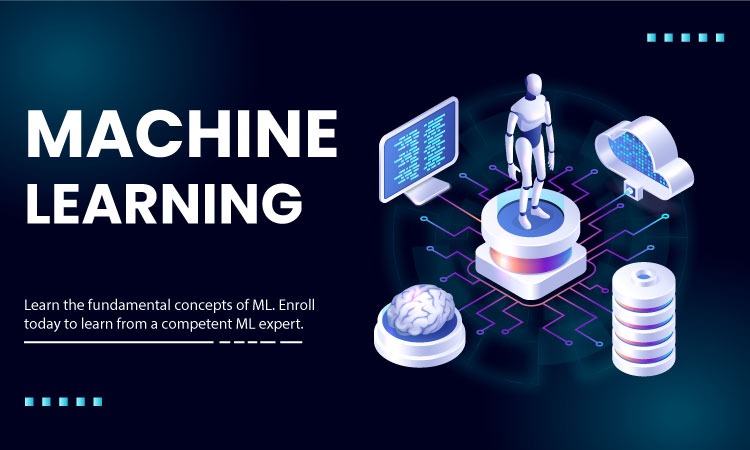Building Smarter Systems with Machine Learning
Machine learning (ML) is transforming industries by enabling systems to learn from data and make intelligent decisions without explicit programming. From personalized recommendations on streaming platforms to automated fraud detection, machine learning is at the heart of smarter systems. Explore how ML helps in building intelligent systems, the benefits it brings, and how to get started with the Best Machine Learning Course to enhance your career prospects.
What is Machine Learning?
Machine learning is a branch of artificial intelligence (AI) that allows machines to learn from historical data, identify patterns, and make decisions with minimal human intervention. ML systems leverage vast amounts of data, using algorithms to analyze it, learn from it, and make predictions or decisions without being explicitly programmed for each task.
Key Concepts of Machine Learning
- Supervised Learning
- The model is trained on labeled data (input-output pairs).
- Example: Predicting house prices based on historical data (features: size, location, price).
- Unsupervised Learning
- The model identifies patterns in data without labeled outcomes.
- Example: Grouping customers into segments based on purchasing behavior (clustering).
- Reinforcement Learning
- The model learns by interacting with its environment and receiving rewards for performing certain actions.
- Example: Training a robot to walk through trial and error.
- Deep Learning
- A subfield of ML that uses neural networks with multiple layers (deep neural networks) to model complex patterns.
- Example: Image recognition, speech-to-text systems.
Components of Machine Learning:

- Data: The fuel of machine learning. Large, high-quality datasets are essential for training accurate models.
- Algorithms: Different algorithms such as decision trees, neural networks, and support vector machines are used to process data.
- Model Training: The process of feeding data into algorithms to create a predictive model.
- Evaluation: The model is evaluated on test data to ensure its accuracy and reliability.
How Machine Learning Powers Smarter Systems
- Automation and Efficiency: Machine learning enables automation of complex tasks. For example, chatbots use ML algorithms to understand and respond to customer queries, improving customer service efficiency.
- Predictive Analytics: ML-powered systems can analyze historical data to forecast future outcomes. This is valuable in industries like healthcare, where predictive analytics can help diagnose diseases early, or in finance, where algorithms predict stock market trends.
- Enhanced Decision-Making: Smarter systems leverage machine learning to make better decisions. For example, fraud detection systems in banks use ML models to analyze transaction patterns and flag suspicious activities.
- Personalization: Machine learning enables systems to personalize user experiences. Streaming platforms like Netflix and music apps like Spotify use ML algorithms to suggest content based on user preferences.
Types of Machine Learning Algorithms

| Algorithm | Description | Use Cases |
| Supervised Learning | Trains on labeled data to predict outcomes. | Fraud detection, email filtering |
| Unsupervised Learning | Finds patterns in unlabeled data. | Customer segmentation, anomaly detection |
| Reinforcement Learning | Learned by interacting with an environment and receiving feedback (rewards or penalties). | Robotics, game AI, self-driving cars |
Impact of Machine Learning in Different Industries

How to Start with Machine Learning
Getting started with machine learning requires a solid understanding of algorithms, data processing, and model evaluation. Fortunately, there are plenty of resources available online to help you develop these skills. One of the best ways to start is by enrolling in a comprehensive course.
Finding the Right Course
If you’re serious about building a career in this field, consider enrolling in a Machine Learning Course in Gurgaon. Such courses offer in-depth knowledge, hands-on projects, and real-world applications that can help you master ML concepts.

Look for courses that cover popular algorithms, data processing techniques, and machine learning tools like TensorFlow, PyTorch, and Scikit-learn. Consider taking a Best Machine Learning Course to enhance your skills and stay ahead in the fast-evolving tech landscape.
By enrolling in a Machine Learning Course in Gurgaon, you’ll gain access to industry-leading training and network opportunities in this thriving city. The course equips you with the technical knowledge and practical experience needed to excel in machine-learning roles.
Conclusion
Machine learning is revolutionizing industries by building smarter, more efficient systems that can automate tasks, predict outcomes, and personalize user experiences. From healthcare to finance, the impact of machine learning is evident across various sectors. If you’re looking to build a career in this field, enrolling in the Machine Learning Course is the right step.














Post Comment